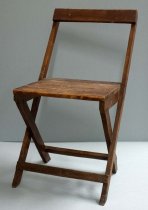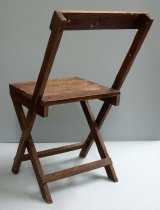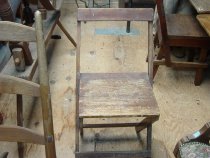Object Record
Images



Metadata
Title |
Chair, c.1942-1945 |
Object Name |
Chair |
Description |
Chair, c.1942-1945. It was made in Rohwer, Arkansas at the Rohwer War Relocation Center during WWII. It includes a wooden seat back, a seat connected perpendicularly from the seat back and the wooden legs,and small thin boards that connect horizontally and vertically near the four wooden legs. Its seat back is slightly tilted, and connect to its top rail board, and the left and right side of the wooden seat. On the front of the top rail, it has small metal nails on left and right of the board that connecting it to the seat back and small holes on the bottom of the top rail. On the side of the chair, two medium sized screws connect to the left and right side of the seat. Near the bottom of the chair, another set of two medium sized screws connect its wooden legs making them cross perpendicularly from each other. The top of the seat has two medium sized boards, and one small sized boards separate from each other, but parallel to one another. These boards have three or four metal nails spaced out connecting it to the rest of the seat. On the bottom and underneath the seat of the chair, two small thin board connect parallel to the seat, which are perpendicular to the wooden legs connected by metal nails and metal screws. |
Date |
c. 1942-1945 |
Catalog Number |
2003.075.001 |
Collection |
3D - Furniture |
Creator |
Eguchi, Kanichi |
Role |
Wood-carver |
Inscription Text |
none |
Provenance |
Chair made in Rohwer, Arkansas at the Rohwer War Relocation Center during WWII by donor's father-in-law |
Notes |
"Kanichi Eguchi was born in 1888 in Japan either Kiushiu or Kyushu Island. He and his family lived in San Mateo, California. He was one of 103,014 for Japanese Americans evacuated from the states of Washington, Oregon and California to ten relocation centers operated by the war Relocation Authority during World War II. He was sent to He spoke, wrote and read Japanese, and spoke English. He and his wife Mito were both sent to Rohwer Assembly Center in Stockton, California. Both his birth mother and father were from Japan with his father's occupation as a farm operator or manager. He only went to elementary school for 8 years and has no degree. He arrived in the United States in 1912, spent 20 or more years in Japan. He died in 1973." [http://www.japaneserelocation.org/index.php?page=directory&rec=6423-10/18/2016] "The euphemistically named "Rohwer Relocation Center" in Arkansas was one of ten concentration camps administered by the War Relocation Authority (WRA) to house Japanese Americans forcibly removed from the West Coast during World War II...The Rohwer site is located in southeastern Arkansas, in Desha County, twelve miles northeast of McGehee, 110 miles southeast of Little Rock, and just 27 miles from the Rohwer camp....The Rohwer site is located in southeastern Arkansas, in Desha County, twelve miles northeast of McGehee, 110 miles southeast of Little Rock, and just 27 miles from the Rohwer camp." [http://encyclopedia.densho.org/Rohwer/-10/18/2016] "The Stockton Assembly Center was one of fifteen temporary detention centers (euphemistically called "assembly centers") administered by the Wartime Civil Control Administration. Most Japanese Americans forcibly removed from the West Coast were sent to one of these centers during the spring and summer of 1942 while the more permanent concentration camps were being prepared...The Stockton Assembly Center was built at the San Joaquin County Fairgrounds site, just a few blocks southeast of the Stockton city center. The detention facility was populated from May 10 to October 17, a total of 160 days. The site included 125 barracks in the racetrack infield, along with forty more east of the fairgrounds...Upon the closing of the camp, nearly all of the inmates were transferred to the Rohwer, Arkansas camp for long-term confinement, with a handful being sent to Gila River, Arizona." [http://encyclopedia.densho.org/Stockton_%28detention_facility%29/-10/18/2016] |
Dimensions |
H-28.125 W-14.75 D-2.375 inches |
Search Terms |
Chair Chairs Furniture Household Goods Japanese Americans Japanese Americans - Internment Japanese Americans - Relocation Center WWII WWII - Incarceration Japanese American |
Subjects |
Chairs Furniture Japanese internment World War II |
People |
Eguchi, Kanichi |
Credit line |
Courtesy of Yoneo Kawakita |
